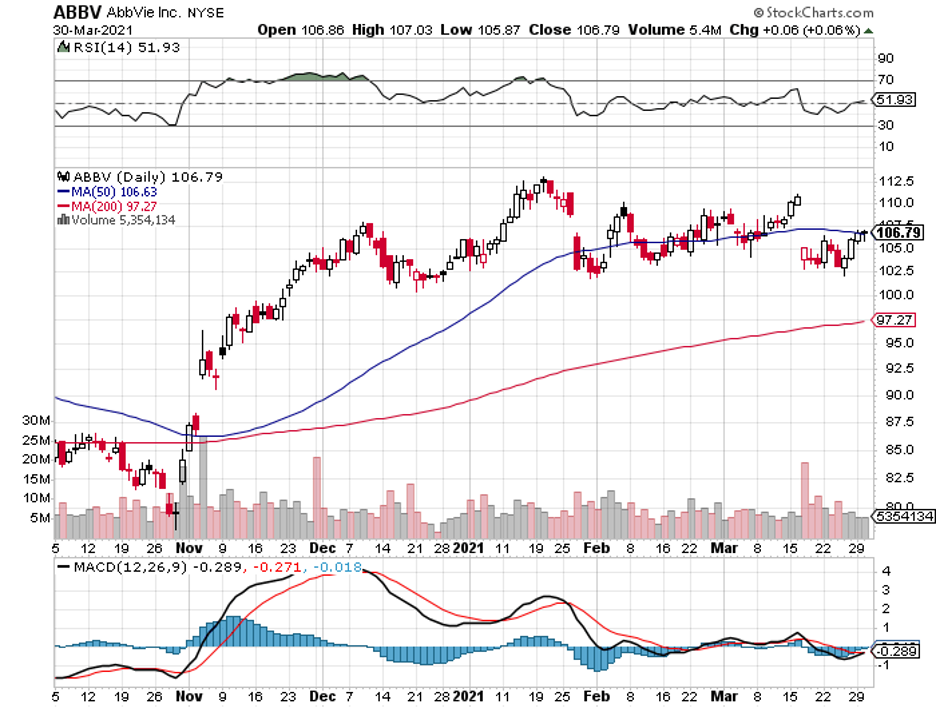High-Yield Stock Up for Grabs
Something curious is happening at the FDA, and it’s causing investors to be jittery. Drugs that are sure to gain approval keep encountering roadblocks.
What began as a handful of biotechnology stocks getting trampled is turning out to be a broader pullback caused by fears of a tougher and stricter regulatory environment for drug developers.
Following these changes, the SPDR S&P Biotech (XBI) slid by roughly 12% this month.
The idea that the somewhat predictable regulatory results in the past four or five years may no longer be as predictable obviously ramped up the perceived riskiness of this industry.
One bellwether of this change is AbbVie (ABBV), which submitted an application for the expanded use of rheumatoid arthritis Rinvoq in March. It recently announced that the regulatory board is extending the evaluation for three months.
While this isn’t a cause for alarm, it’s enough to unsettle some investors since Rinvoq is expected to replace AbbVie’s blockbuster drug Humira when the latter loses its patent exclusivity in 2023.
However, the reason behind FDA’s extension is likely because of the safety concerns found in a similar drug, Xeljanz, by Pfizer (PFE).
Considering the similarities of the two, it makes sense for the regulatory board to exercise more caution on AbbVie’s product.
The rise and fall of AbbVie has always centered on Humira, with this top-selling drug raking in $19.8 billion in sales in 2020 alone. That’s actually lower than its usual revenue a few years back.
Humira’s loss of exclusivity is projected to result in medium-term headwind to the company as more and more biosimilars pressure revenue.
However, AbbVie has been working on offsetting the estimated losses by expanding its other programs.
For instance, the revenue for AbbVie’s non-Humira immunology sector, led by Skyrizi and Rinvoq, is projected to double to reach $4.6 billion in 2021.
By 2025, AbbVie expects Rinvoq and Skyrizi sales to reach $15 billion annually.
Meanwhile, a considerable uptick is anticipated from its neuroscience division’s revenue, led by Vraylar, to generate $5.7 billion in 2021.
As for its hematologic oncology franchise, spearheaded by Imbruvica and Venclexta, this sector’s revenue is expected to increase in double digits to reach $7.5 billion this year as well.
On top of these, AbbVie has been busy looking for suitable acquisitions to diversify its revenue stream.
A notable deal it made was in 2015 with Pharmacyclics. This acquisition actually added the mega-blockbuster drug Imbruvica to AbbVie’s portfolio.
In May 2020, AbbVie completed its deal to purchase Allergan. This $63 billion merger is expected to boost the global distribution capacity of AbbVie and bolster its therapeutic sales channels.
By 2023, sales of the products acquired from Allergan’s pipeline are estimated to add at least $2 billion to AbbVie’s annual revenue.
All in all, these sectors are all well-positioned to substantially offset the fall of Humira’s revenue thanks to the rapid growth and aggressive indication expansion efforts of the company.
Nonetheless, the anxiety of the delayed FDA approval for Rinvoq’s expanded use is understandable.
After all, AbbVie expects this particular drug to contribute to doubling the 2021 sales of the franchise from $2.3 billion to $4.6 billion.
Moreover, this is a cornerstone in the company’s post-Humira era in less than two years.
However, the three-month delay will have a minimal impact on the 2021 revenues of the company and a negligible effect when we consider the long term.
Realistically, this would cost AbbVie roughly less than $1 billion in sales, which amounts to less than 2% of the total projected revenues of the company this year.
During times like these, it’s crucial to remember that the pharmaceutical industry is an extremely bumpy road.
There’s no such thing as a linear progression in this line of business, which is why it’s vital to choose companies with established track records and highly capable management teams.
If it helps ease any anxiety, then it might be useful to think that AbbVie is a favored stock by Warren Buffett’s Berkshire Hathaway (BRK.B).
The Oracle of Omaha currently holds 4.27 million shares of this company. Meanwhile, BlackRock (BLK) holds 2.41 million shares, while Ken Griffin’s Citadel Advisors has 786,000 shares.
AbbVie is a mature, larger-cap biopharmaceutical stock that’s selling at an affordable price these days.
Despite the revenue declines and plunges in earnings of countless businesses in 2020, AbbVie still managed to deliver strong operating and financial results—and the company still has a long way to go.
AbbVie is expected to deliver at least 4.8% in annual earnings growth over the course of the next five years—a highly conservative estimate considering that the company reported 21.9% growth in the past five years.
Moreover, AbbVie is safely positioned to deliver 6% long-term annual dividend growth.
AbbVie was able to generate 3.3% growth in its operational revenue in 2020, recording $45.804 billion in net revenues.
In the past weeks, I’ve seen AbbVie shares go down by roughly 6%. However, I think the fear here is exaggerated and the market might be overreacting to the uncertainty caused by stricter FDA guidelines.
Instead of letting the anxiety take control, I believe it’s best to heed the advice of Warren Buffett in this situation: “The market is a device for transferring money from the impatient to the patient.”
Therefore, I think patient investors should take a look at AbbVie stock today.


